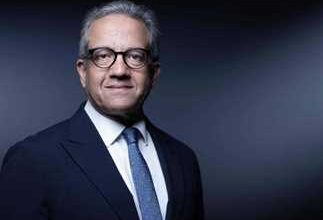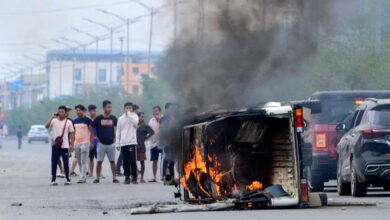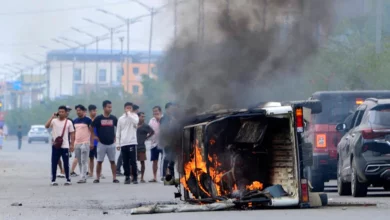Street clashes two months ago between supporters of rival candidates in the upcoming parliamentary elections in Port Said and Daqahliya governorates claimed at least two lives, according to media reports.
In another incident, the son of MP Bilal al-Siwy of Matrouh Governorate was kidnapped in late September. His abduction was reportedly in connection with November's parliamentary elections. Similarly, in early October, when Nasserist MP Hamdeen Sabbahi was hit in a car accident, the mouthpiece of his party, Al-Karama paper, said the accident was related to the electoral race.
Within the ruling National Democratic Party (NDP), the candidacy nomination process is fomenting tension. The process has witnessed clashes between candidate supporters and heightened security around NDP offices.
With violence erupting even before the official campaign period kicks off, fears of more clashes in the lead up to the poll are growing.
In the 2000 elections, election violence claimed eight lives and left 64 Egyptians injured. In the 2005 poll, at least 12 people lost their lives and 500 were injured in election-related violence, according to a report by the Egyptian Organization for Human Rights.
"Violence in the upcoming parliamentary elections may result from seats being hotly contested, or in response to government irregularities during the balloting," says David Schenker, director of the Program on Arab Politics at the Washington Institute for Near East Policy.
"Security forces will also likely prevent meaningful monitoring of the polls, which could result in clashes with civil society activists pushing for transparency," Schenker adds.
Moreover, this year’s elections will not be conducted under full judicial supervision; a 2007 constitutional amendment abolished the requirement to have a judge in each polling station.
State institutions, particularly the Ministry of the Interior which organizes the elections, are not accountable for election violence, says Nasser Amin, director of the Arab Center for the Independence of the Judiciary and Legal Profession.
"The state doesn’t usually investigate the killings around the elections. After the announcement of the results, officials close the whole issue of the elections," Amin, who has monitored various Egyptian elections, says.
According to Amin, violence perpetrated by police officers is of a different caliber than aggressive acts by candidate supporters.
"In cases of [violence by candidate supporters], the police can control the scene and prevent individuals from escalating the violence," says Amin. “In contrast, the violence committed by police forces, whether they are riot police, plainclothes police officers or armed thugs, could turn sometimes into massacres.”
Police violence in past elections has taken many forms, such as cordoning off polling stations with security personnel, preventing voters from reaching polling stations, and using tear gas, rubber-coated bullets and open fire with live ammunition.
Sectarianism is another source of recently-heightened tension. "Egypt has been sitting on top of a sectarian volcano," writes academic Mariz Tadros in a report published by the Middle East Research and Information Project.
Three Muslims are currently on trial for fatally shooting six Christians and a Muslim man outside a church in the city of Nagaa Hammadi, southern Egypt, last January.
Moreover, last month witnessed conflicting sectarian remarks between Muslim scholars and Bishop Bishoy, secretary of the Holy Synod.
Experts fear that tensions could lead to more violence, or have a knock-on effect on political representation.
Samir Morcos, political researcher, says that "in such an atmosphere of political tensions, it is possible to have a political utilization of religion to weaken Christian candidates."
Violence also pervades efforts to buy votes.
"It's becoming obvious that candidates in Cairo and other urban places are involved in acts of violence as they seek to buy as many votes as they can," says writer and journalist Saad Hagras. The deployment of thuggery is closely associated with financial deals, when disagreements loom around prices of votes (reported in the press this week to have reached between LE100-700 per vote in the Alexandria region).
Increasing disputes between large, influential families over electoral seats are another major reason for electoral violence.
Last year, two men from the two prominent tribes in al-Mahroussa village in Qena–the Arab and the Fellaheen tribes–lost their lives in a power struggle centered around parliamentary representation. The Arab tribe’s current representative in parliament stirred a clash with the Fellaheen families, resulting in one Fellaheen death. In response, Fellaheen members took the life of an Arab family member.
"People of the village are deeply divided but they are united in two things: They wish the whole issue of elections to be over, with the least possible casualties, and they are determined not to go to the polls," says Ibrahim Ahmed, resident of al-Mahroussa village.
Human rights activist and lawyer Negad al-Borai argues that family power can be more important than political parties in the parliamentary race. "It’s very common to see family members as the winners of the elections because they have the power that makes it easier for them to control the polling stations, even with violence," Borai says.




